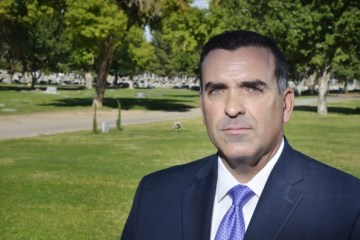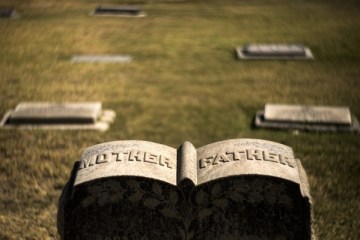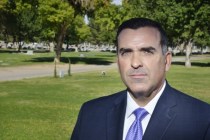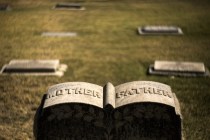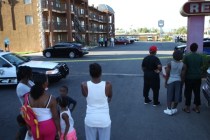In Vegas, some deaths become infamous — VIDEO
Thousands of people die in Las Vegas each year, but only few have been well-known — Pat Morita, John Entwistle and B.B. King, for example. In some of those cases, their death becomes infamous, as in the cases of Tupac Shakur, Ted Binion and Dan Wheldon.
TUPAC SHAKUR
The evening of September 7, 1996, fans packed the MGM Grand Casino for the Saturday night fight between Bruce Seldon vs. Mike Tyson. Among the crowd is American rapper, author, actor, and poet, Tupac Shakur, hailed as one of the most influential rappers of all time.
After the match Shakur's entourage recognized a rival gang member from Compton, California.
Orlando "Baby Lane" Anderson, an alleged Crips gang member, is attacked by Shakur's group. The incident is captured on surveillance video.
After the scuffle, Shakur and CEO of Death Row Records, "Suge" Knight, climbed into Knight's 1996 black BMW sedan and, followed by his associates, headed for Club 662, a nightclub owned by the label.
The convoy stops at a red light at the intersection of Flamingo Road and Koval Lane at about 11:10 pm where two women pull up on the BMW's left side. Shakur stands up through the sun roof to invite them to the nightclub.
Within moments a white Cadillac pulls along the sedan's right side, lowers a window, and quickly fires 12-13 shots from a high-powered handgun. Tupac Shakur is hit 4 times, in his right hand and thigh, the pelvis, and his chest, puncturing his right lung. Knight suffers a minor head wound but quickly turns the BMW around and heads west on Flamingo, then onto the strip where police stop the vehicle.
Over 19 years later, his killer has never been caught while numerous conspiracies still swirl around the murder and the elusive question, "Who shot Tupac Shakur?"
Get more details in the video above.
TED BINION
Lonnie Theodore "Ted" Binion loved money, booze, hard-bodied women and black-tar heroin. Ted was one of the sons of racketeer, gambling icon Benny Binion, who owned and ran Binion's Horseshoe.
At the age of 21, Ted assumed position as casino manager and became well known for his womanizing, boozing and drug-use as well as for rubbing elbows with mob figures. Then, in March of 1995, Ted Binion met 23-year-old Sandy Murphy at Cheetah's topless bar where she was working. Shortly thereafter Binion's wife Doris filed for divorce, left with their daughter for Texas and Sandy moved in with Ted.
In 1997 the Nevada Gaming Control Board suspended Binion's license and a year later permanently revoked after he failed a drug test.
Now excluded from the casino that bore his family name, Ted's heroin use increased and in the summer of 1998 he had contracted with associate, Rick Tabish, to build an underground vault on his property in Pahrump to store over eight million dollars worth of silver bars and rare coins.
The treasure was buried on the 4th of July, 1998. Less than two months later, Ted Binion was dead. Binion's body was discovered 3:55 PM on September 17th by Sandy Murphy. An autopsy confirmed that Binion died from a lethal combination of Xanax and heroin.
The day before his death, Binion had purchased 12 pieces of tar heroin from Peter Sheridan, a drug dealer, and personally filled a prescription for 120 Xanax tablets at a local pharmacy.
But in the days that followed, what looked like a typical overdose quickly took on suspicious implications as details began to surface.
Get all the details in the video above.
DAN WHELDON
In October 2011, Las Vegas hosted the last race of the IZOD IndyCar World Championship at the Las Vegas Motor Speedway, it's first IndyCar race since 2000. As drivers headed into turn one of the 11th lap, Wade Cunningham and James Hinchcliffe make contact setting off a chain reaction — sending J. R. Hildebrand's car airborne.
Collisions rippled down the track as 15 drivers rapidly converge and plow into each other. British racing driver, 2005 IndyCar Series champion and a two-time winner of the Indianapolis 500, Daniel Clive Wheldon, in car number 77, entered the fray traveling at 224 mph as three cars collided in front of him.
Wheldon managed to reduce his speed to 165 mph before he hit the back of Charlie Kimball's car and went airborne. Number 77 flew 325 feet down the track in a barrel roll, finally smashing the catch fence, cockpit first, and burst into flames. Wheldon's head hit one of the fence poles resulting in severe head trauma.
Chaos continued as more drivers collided, sending Will Power's #12 aloft in an airborne tumble of 315 feet, fracturing his back. The Safety team descended upon #77 within 35 seconds of the impact. Wheldon's lower extremities were entrapped but the team extricated him within 4 minutes.
Get all the details in the video above.
Contact Michael Quine at mquine@reviewjournal.com. Find him on Twitter: @Vegas88s
One sure bet: Death in Las Vegas



